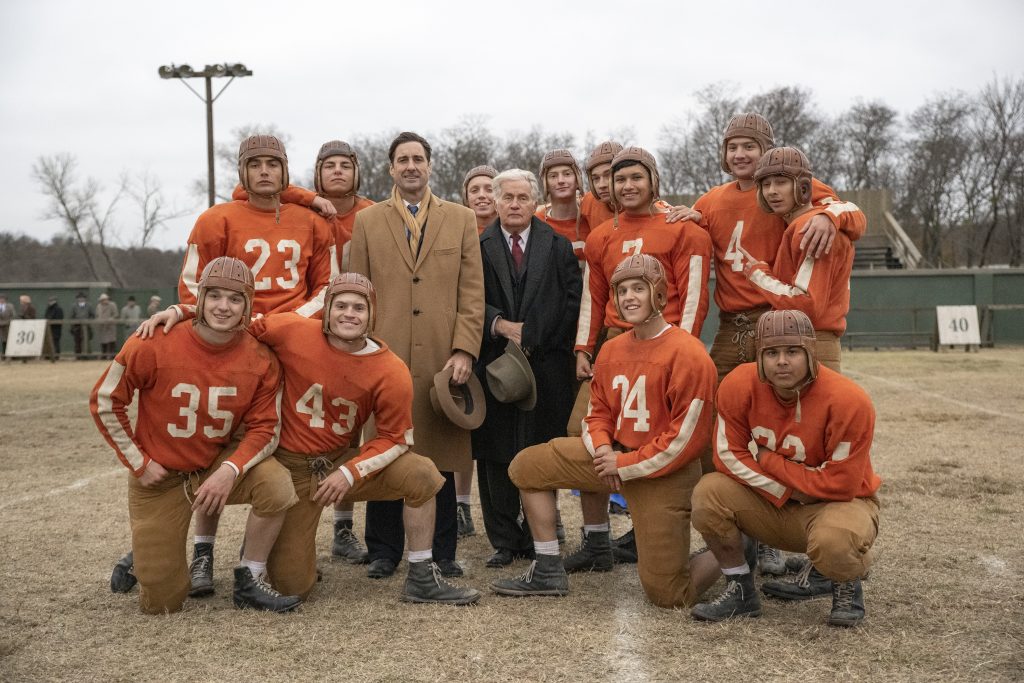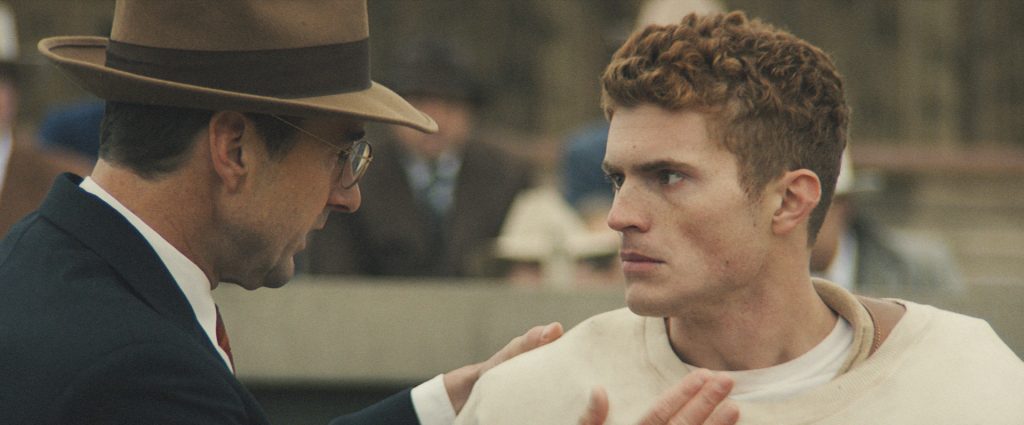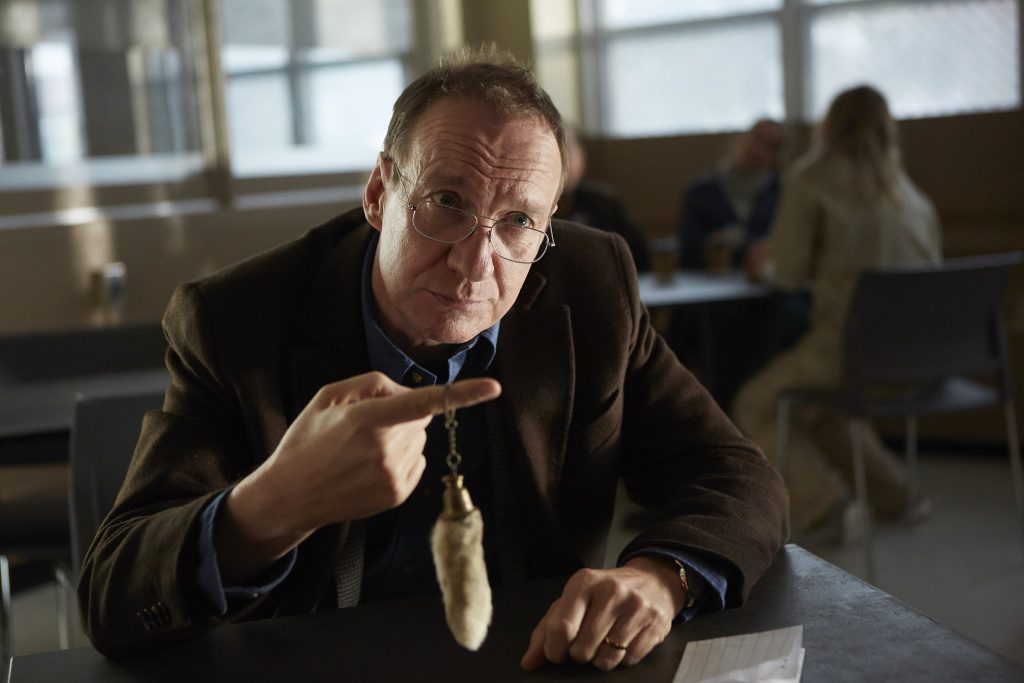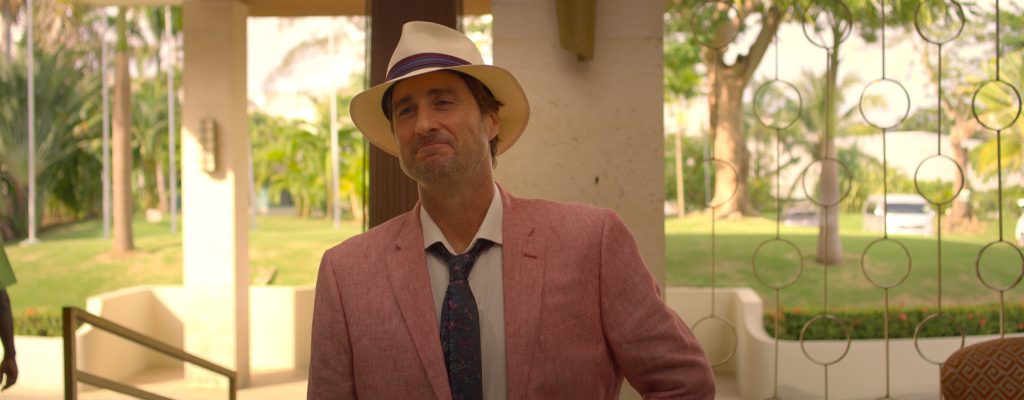December 30, 2021
by Carla Hay
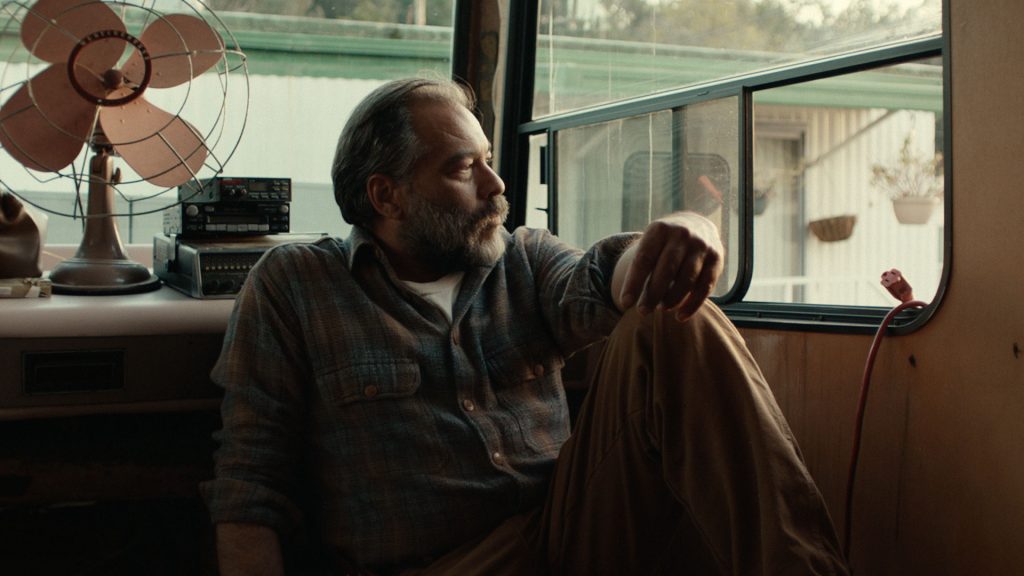
Directed by Erin Elders
Culture Representation: Taking place in an unnamed U.S. city, the dramatic film “The Cleaner” features a predominantly white cast of characters (with a few African Americans, Latinos and Asians) representing the working-class and middle-class.
Culture Clash: A down-on-his luck house cleaner gets mixed up in dangerous activities when he’s hired to find a woman’s missing and wayward adult son.
Culture Audience: “The Cleaner” will appeal primarily to people who don’t mind watching a poorly constructed crime movie with subpar acting.
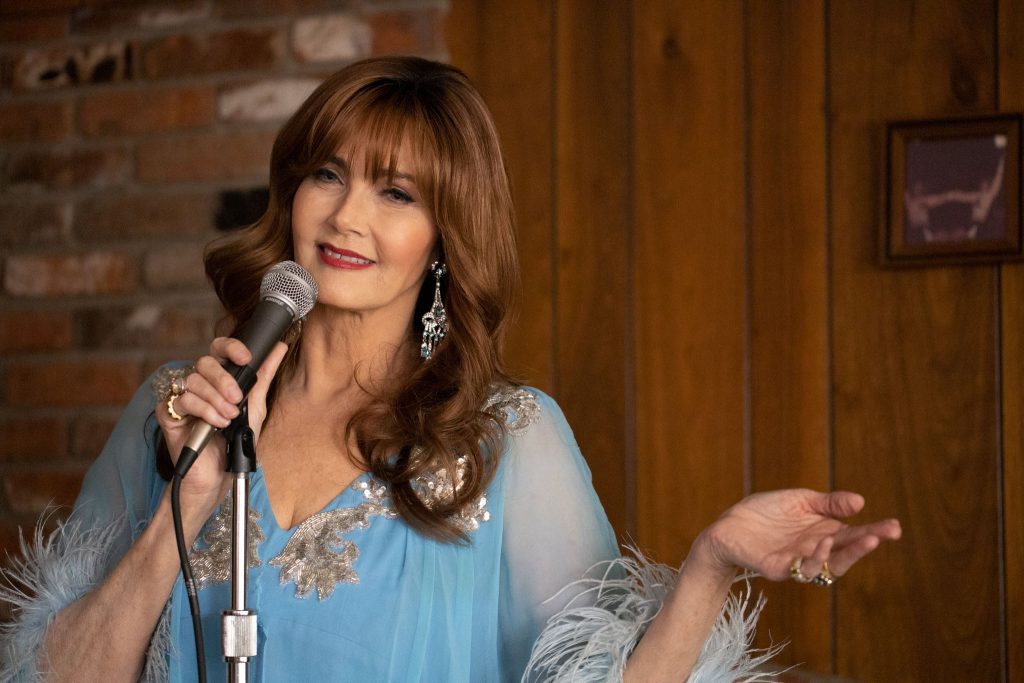
There’s something dirty and rotten about “The Cleaner.” And it’s not just the scumbag characters in this movie. It’s a crime drama that tries to go for gritty realism, but it’s just a ridiculous mess of a story with terrible dialogue, lousy acting and uneven pacing. The ending is so cliché, it’s cringeworthy.
“The Cleaner” is the feature-film directorial debut of Erin Elders, who co-wrote the movie with King Orba. Unfortunately, Elders seems to have let his screenwriter collaboration with Orba cloud his judgment on who to cast as the movie’s protagonist/title character. Orba is the lead character in this movie, and his wooden acting is by far the worst in this cast, which has a random mix of longtime actors whose careers peaked years ago.
It’s also one of those movies that takes too long (the first third of the movie) to get to the point of the story. In “The Cleaner,” Orba portrays Buck Enderly, a down-on-his-luck house cleaner who lives alone in a trailer in an unnamed U.S. city. Before he was a house cleaner, he sold RVs, but he got fired from his job for being an underperforming salesperson. Buck is so broke that he has to get around by bicycle because his car blew its transmission, and he can’t afford to get the car fixed or buy a new car.
Enderly Cleaning is a company that Buck’s cranky mother Sharon Enderly (played by Shelley Long) founded years ago. She’s now retired but concerned that Buck won’t be able to keep the business going. And she has cause for concern: Business has been very slow lately. Because of a recession, people are making cutbacks on their household budgets, including housecleaning services.
“The Cleaner” is a slow-paced film with a rushed ending. Much of the slow pace is because the movie wastes a lot of time showing Buck’s somewhat tense relationship with his mother Sharon, and how he gets to know two new neighbors who move in next door to Sharon. These neighbors are live-in lovers Trent (played by Hopper Penn) and Becky (played by Eden Brolin), who have a volatile relationship because Trent physically and emotionally abuses Becky.
Becky invites Sharon to a housewarming party, where Sharon gets drunk and then sprains her ankle. And so, there’s some drama with Buck having to take Sharon to a hospital, but he doesn’t have a car, so he has to ask Trent and Becky for a ride. It’s all just a contrivance because it leads to a subplot where Sharon is prescribed medication that her insurance doesn’t fully cover.
That leads to Buck stealing batteries (don’t ask) when he goes to the pharmacy to get her prescription medication and finds out he doesn’t have the money to cover the cost. Buck gets arrested for shoplifting after a silly chase scene where he tries to get away. But what do you know: The cop who arrests Buck just happens to be his estranged younger brother Craig Enderly (played by Faust Checho), who hasn’t spoken to Buck in months because he thinks Buck is a loser.
Luckily for Buck, the pharmacy manager decides not to press charges, so Buck doesn’t spend any time in jail for the shoplifting. And did we mention that Craig has a girlfriend named Vanessa (played by Milena Govich), whom Sharon can’t stand, even though Craig plans to marry Vanessa? Craig and Sharon have a rocky relationship because Craig blames Sharon for her husband (the father of Craig and Buck) leaving the family when Craig and Buck were children.
All of this family drama with Sharon and her children has nothing to do with what this movie is really about, but the filmmakers clogged up “The Cleaner” with this storyline, in order to pad out a very thin plot. There are also several time-wasting scenes with Buck hanging out with his marijuana dealer James (played by James Paxton), who’s young enough to be Buck’s son. Even though Buck whines to a lot of people about how broke he is, he still has enough money to buy marijuana. Priorities.
What “The Cleaner” is really about is an unexpected job that Buck is hired to do: He agrees to be an unofficial private investigator (even though he has no experience in this area) to find a missing person. The job comes about when one of Buck’s housecleaning clients named Jim Russell (played by Luke Wilson) lays him off due to budget cuts. Jim feels bad about letting Buck go, so Jim refers Buck to a neighbor who might need housecleaning services.
This neighbor is a has-been/retired singer named Carlene Briggs (played by Lynda Carter), who lives alone and isn’t interested in hiring Buck for housecleaning services. When Buck goes over to Carlene’s house for the first time, she openly flirts with him and makes him listen to her croon in her living room, as if it’s some kind of cabaret lounge. She wears a frilly négligée and even has a microphone for this living-room performance. Yes, it’s that kind of movie.
Buck resists Carlene’s flirtatious advances, so she then asks him if he can provide some investigative services for her. Apparently, even though Buck has no experience in private detective work, Carlene thinks that Buck looks like the type who knows his way around the seedy underbelly of this community. And so, she asks Buck to find her missing adult son Andrew Briggs (played by Shiloh Fernandez), whom she describes as a drug addict and a thief.
Carlene is only paying $1,000 to Buck if he finds Andrew, which is an appallingly low amount of money for this type of private investigator work. Buck, like an idiot, doesn’t ask for more money. He’s so desperate for money, he says yes to the job. Carlene doesn’t seem concerned that she’s hiring someone who doesn’t know what he’s doing. It’s one of many eye-rolling aspects of this moronic movie.
“The Cleaner” then goes down a rabbit hole of stupidity as viewers are expected to believe some of the things that happen when a woefully incompetent Buck does some “detective work” that involves some “only in a movie” type of dumb luck. The only realistic thing about Buck’s “detective work” is that he has to ask his cop brother Craig for help in accessing information records that only law enforcement or real private detectives would be able to access.
The movie also has somewhat strange and random casting of actors that’s an awkward mix. Soleil Moon Frye, best known for starring in the 1980s sitcom “Punky Brewster,” has a cameo as a trashy-looking barfly named Kristi. She’s not believable in this role. And it seems like the only reason why Carter took the role in this film is to showcase her singing, which does not fit this supposedly gritty story well at all. The ending of “The Cleaner” ties in to the movie’s opening scene, where a shooting takes place at a diner. But it’s not enough to cover up all the loose ends and unnecessary scenes that make the movie an insufferable, tangled mess.
1091 Pictures released “The Cleaner” on digital and VOD on October 12, 2021.



